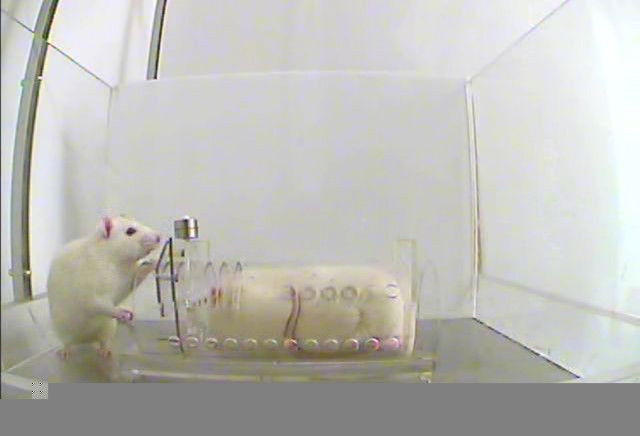Rats Choose Empathy Over Chocolate

Rats would rather release fellow species from restraints than have a nibble of chocolate, a new study shows, giving evidence that empathy may extend beyond humans and our simian cousins.
When a rat was put in a restraining device, a free-roaming rat would help the trapped animal escape rather than accept a reward, scientists said Thursday.
The experiment, published in the journal Science, worked only when the two rats were familiar with each other beforehand.
Potential empathy extended from the practical escape -- the restraining device had a door that could be opened from the outside. Scientists saw that the free-roaming rat became agitated when it saw the other rat in the restraining device. When there was no rat in the restraining device, then the first rat was fine.
This is the first evidence of helping behavior triggered by empathy in rats, co-author Jean Decety of the University of Chicago said in a statement. There are a lot of ideas in the literature showing that empathy is not unique to humans, and it has been well demonstrated in apes, but in rodents it was not very clear. We put together in one series of experiments evidence of helping behavior based on empathy in rodents, and that's really the first time it's been seen.
Researchers repeated the experiment so that the free rats eventually figured out how to open the trap door that restrained their companion. Once the first rat learned how to do this, it would free the trapped rat as soon as possible, even though the second rat might end up in a different compartment. Scientists said that observation showed the first rat acted out of empathy and not loneliness.
And here's a twist to the tale that will baffle chocolate lovers everywhere. When offered chocolate, the free rat was just as likely to let its friend loose as it was to go for the chocolate.
Scientists tested the idea by putting two restraining devices in the box, one with a restrained a rat and the other with chocolate chips.
That was very compelling, study co-author Peggy Mason said in a statement. It said to us that essentially helping their cagemate is on a part with chocolate. He can hog the entire chocolate stash if he wanted to, and he does not. We were shocked.
Matthew Campbell, a postdoctoral fellow at the Yerkes National Primate Research Center at Emory University who has done empathy research on chimpanzees and who was not involved in the study, thought the food component was a nice addition.
It would be interesting to go a step further and see if a rat would give another access to chocolate, even if the second was unrestrained, Campbell wrote to International Business Times in an email. The distress component would be removed, and it would be down to the motivation of the rat to help the other.
Studies such as this one can possibly help humans understand a thing or two about empathy, wrote Jaak Panksepp, a psychologist who studies animal well-being at Washington State University, in companion piece in Science.
Simplified models of empathy, as in mice and rats, offer new inroads for understanding our own social-emotional nature and nurture, Panksepp wrote. Such knowledge may eventually help us promote nurturant behaviors in humans.
© Copyright IBTimes 2024. All rights reserved.











